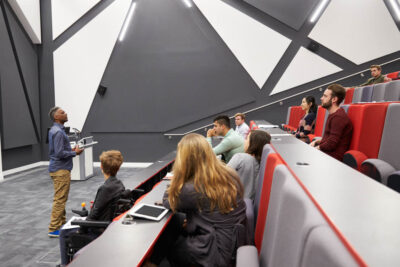- All Blog Categories
- Adult Education Blog
- Advancement Blog
- Community College Blog
- Data & Analytics Blog
- Enrollment Blog
- Higher Education Strategy Blog
- K-12 District Leadership Blog
- Student Success Blog
Our Blogs
Get the latest insights from EAB experts on a variety of topics and terrains from enrollment to student success to K-12 education to higher education strategy and beyond.

The real demographic crisis isn't national—it's regional

What are students asking university chatbots?

What higher ed can learn from these successful academic program revitalizations

Preparing for the end of Grad PLUS: 4 strategies to rethink graduate cost and aid
EAB Blogs by the Numbers
100+
Blogs authored last year8
Different blogs that span topics in education53
Contributing expertsRecent and Featured Posts from Every Blog
-
Higher Education Strategy Blog
EAB Wrapped 2025: A year of reckoning—and reinvention—in higher ed
Before we head into 2026, we're looking back at the top blogs, guides, infographics, webinars, and other insights that resonated most with readers.
Blog -
Enrollment Blog
AI visibility is critical when competing for student enrollments
Boost your .edu’s AI visibility with strategies to strengthen E-E-A-T, improve search performance, and protect your brand in AI-driven search.
Blog -
Adult Education Blog
When Grad PLUS disappears: What 8,000+ grad students said about paying for school
Graduate PLUS is gone, cost is rising, and students are more aid-dependent than ever. Learn how schools can adapt pricing and aid to protect enrollment.
Blog -
Advancement Blog
Four advancement predictions for 2026
Explore top predictions guiding advancement teams as they navigate donor shifts, digital growth, financial pressures, and new strategies for stronger giving.
Blog -
Student Success Blog
Four signs it’s time to break up with your student CRM
Discover the four key signs you need a new student CRM, from painful implementation to hidden fees. Learn what higher ed leaders look for in a better CRM partner. Read more.
Blog -
Higher Education Strategy Blog
EAB experts reflect: The conversations that defined higher ed in 2025
Explore the trends, questions, and breakthroughs that defined EAB's work with higher ed leaders in 2025.
Blog -
Adult Education Blog
4 predictions for 2026: What’s next for graduate and online enrollment
Graduate education faces disruption from AI, shifting demand, and new enrollment winners. See 2025 trends and four predictions shaping 2026.
Blog -
Enrollment Blog
Demographics shape the enrollment landscape, but strategy determines success
Enrollment trends diverge from demographics nationwide; see which states outperform and what strategies help colleges thrive despite population shifts.
Blog -
Adult Education Blog
What changed in the graduate lead gen landscape in 2025
Disruptions reshaped 2025 adult & grad lead gen. Learn five trends—from AI search to declining international interest—and how to build a stronger 2026 strategy.
Blog
Great to see you today! What can I do for you?